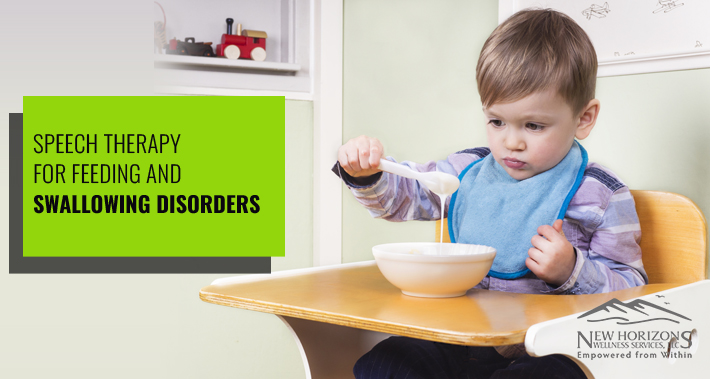
Does your child seem to have trouble eating?
Are they highly picky, eating only certain textures of food?
Do they cough, gag, or drool a lot while they eat?
Does it seem difficult for them to chew or swallow?
If so, these are all signs your child may have a feeding or swallowing disorder.
Here at New Horizons Wellness Services, a multidisciplinary therapy clinic in Tigard Oregon, we offer pediatric speech therapy for kids with feeding and swallowing disorders.
Today, we’ll take a closer look at these disorders.
What Is A Feeding Disorder?
“Feeding” is a broad term used to describe any part of consumption, including:
- Eating or drinking
- Gathering and preparing food and liquid
- Sucking
- Chewing
- Swallowing
Feeding disorders are issues related to any of the above.
If your child is living with a feeding disorder, they might:
- Refuse foods or liquids
- Consume only a restricted variety of foods or liquids
- Misbehave during mealtimes
- Fail to develop and master self feeding skills
- Fail to use developmentally appropriate feeding devices or utensils, such as a spoon or sippy cup
- Experience slow physical growth
This might seem like a frustration at best, but feeding disorders can also lead to poor nutrition.
That in itself comes with a whole host of different issues as well, from developmental delays to missing their speech development milestones to many other chronic illnesses.
What Is A Swallowing Disorder?
Swallowing, on the other hand, is the process where food and liquids are transferred from your mouth to your stomach.
It may not seem like it, but this is a complex process involving four distinct stages:
First, the oral preparatory phase – this includes chewing food and preparing it to be swallowed.
Next, the oral transit phase – which is where food is actually swallowed.
Then, the pharyngeal phase – this helps what you swallow to travel down your pharynx.
Finally, the esophageal phase – where your food is carried into your stomach to be digested.
All this happens while keeping your airway protected, so you don’t choke on what you’re swallowing.
If there’s an issue with any of these phases, it’s a swallowing disorder, also called dysphagia.
These can cause food to end up in your trachea (windpipe), the airway that connects your larynx with your lungs.
And of course, that’s not the direction it ought to go.
Without treatment, pediatric swallowing disorders may lead to a variety of long term consequences, such as:
- Pneumonia
- Malnutrition
- Being underweight
- Dehydration
- Food aversion
- Eating disorders later in life
- Constipation, diarrhea, and other digestive issues
- Unintentionally regurgitating undigested food (rumination disorder)
- Depression, bullying, and poor socialization
How Do You Know If Your Child Has A Feeding Or Swallowing Disorder?
Common symptoms of pediatric feeding and swallowing disorders include:
- Refusing to eat or drink
- Eating only very specific foods
- Taking longer than normal to eat
- Signs of visible discomfort while eating, like an arched or stiff back
- Not being able to breathe while feeding
- Crying while eating
- Coughing, gagging, or drooling while eating
- Liquid leaking from their nose while drinking
- Difficulty chewing
- Falling asleep while feeding
- Pocketing food (holding food in the mouth)
- Getting stuffed up during meals
- Having a gurgly, hoarse, or breathy voice during or shortly after meals
- Frequently vomiting while eating
- Undernutrition and a lack of weight gain
You might also notice your child has difficulty latching while breastfeeding at a much younger age.
It’s important to keep in mind that every child is unique, and your child may not display all the symptoms listed here.
What Causes Feeding And Swallowing Disorders?
Feeding and swallowing disorders may occur for a number of reasons, including:
- cerebral palsy
- Meningitis
- Irritable bowel syndrome
- Gastroesophageal reflux disorder (acid reflux, or GERD)
- Being premature of having a low birth weight
- Heart disease
- Sensory processing disorder
- Cleft lip or palate
- Breathing disorders, such as asthma
- Autism spectrum disorder
- Facial and neck muscle weakness
- Medicines that cause sleepiness or suppress appetite

How Can A Speech Therapist Help?
Speech therapists aren’t just experts at communication.
They’re also skilled at helping diagnose and treating feeding and swallowing disorders.
After all, your child won’t be able to properly communicate if they’re choking on their food.
Their full title is speech-language pathologist – they can help with speech, language, and swallowing disorders.
Your child’s speech therapist will begin with an evaluation in order to gain a better understanding of the areas in need of intervention.
During the evaluation, your child’s speech therapist may:
- Ask questions about your child’s medical history, development, and their current limitations
- Watch how your child moves their mouth and tongue
- Watch your child eat to see how they pick up food, chew, swallow, and drink
- Evaluate your child’s mealtime behaviors
- Recommend special testing as needed, such as an endoscopic assessment
After evaluation, your child’s speech therapist will get to work creating a specialized treatment plan that focuses on your child’s unique strengths and weaknesses.
Additionally, your child’s speech therapist will provide you and your family with plenty of parent resources to help you better understand your child’s difficulties and specific needs.
Let’s take a closer look at some of the therapeutic techniques that might be included in your child’s treatment plan.
1. Posture Modification
Posture plays an important role in feeding and swallowing.
Proper posture while eating helps protect your airways and prevent choking.
Therefore, changing your child’s posture while eating can help them better manage their symptoms.
Techniques may include:
- Tucking their chin down toward their neck
- Slightly tilting their head upwards
- Turning their head to the side to protect their airway
- Standing in an upright position with a 90 degree angle at hips and knees and feet on the floor
- Stabilizing their head
- Assisting with cheek and jaw movement
- Reclining position using a pillow or recline infant seat for support
- Side lying positioning for infants
2. Dietary Modifications
If your child is highly particular about the food they eat, it can lead to poor nutrition.
This can be related to texture, viscosity, temperature, or flavor.
Your child’s speech therapist can work with you to find out what type of foods your child likes, and find ways to make other foods more palatable to them.
3. Feeding Modifications
Your pediatric speech therapist can also recommend changes to the way your child feeds.
This can help them more easily chew or swallow their food.
For instance, pacing techniques may be used to moderate the rate of intake.
In this strategy, your child is encouraged to monitor the rate of their chewing and swallowing.
By encouraging your child to alternate between sips of liquids and bites of solid food, for example, you can slow down their pace and reduce their risk of choking.
4. Sensory Stimulation Techniques
Sensory stimulation techniques are useful for children who are particularly averse to certain food textures.
There are a number of different ways to approach this.
But the goal is to gradually reduce different textures to your child, which can build up their tolerance.
Book Your Appointment With New Horizons Wellness Services Today
If you suspect your child has a feeding or swallowing disorder, don’t hesitate to reach out to New Horizons Wellness Services.
Early intervention can make all the difference.
Our expert speech therapist can help you and your child manage their symptoms.
Book your appointment with New Horizons Wellness Services to help your child develop their feeding and swallowing skills today.
Yours in Health,
New Horizons Wellness Services13333 SW 68th Pkwy,
Tigard, OR 97223
- https://g.page/newhws
New Horizons Wellness Services provides a true multidisciplinary approach to mental & physical health treatments for children, adults and families.
